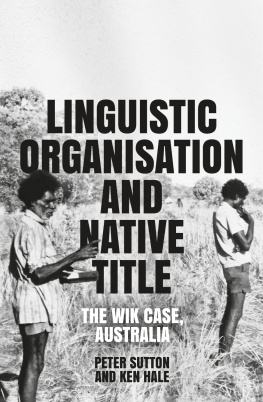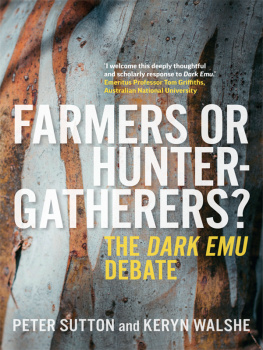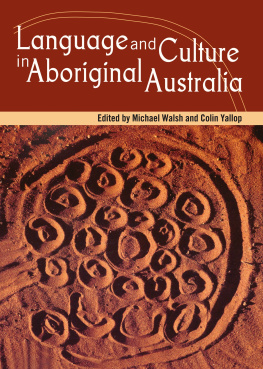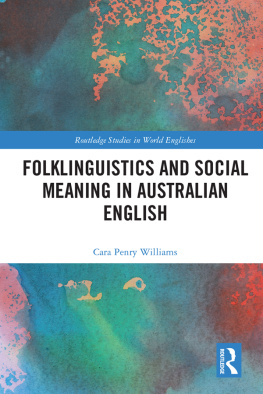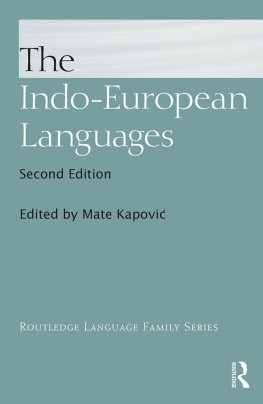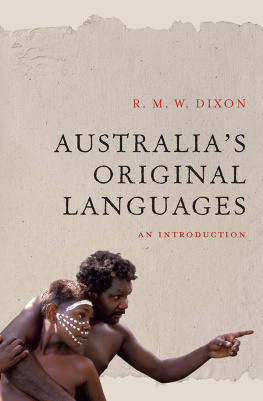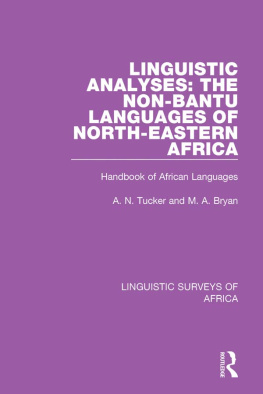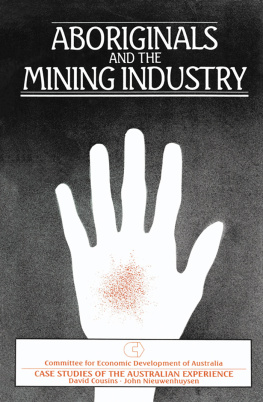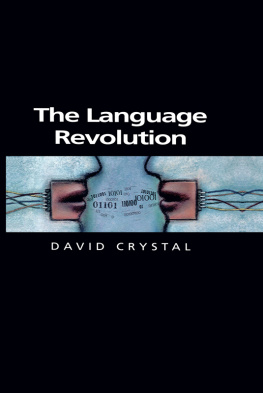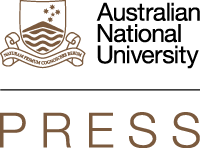Linguistic Organisation and Native Title The Wik Case, Australia The image used on the cover of this book shows Noel Peemuggina mapping Kuurn-engkech, a site in his own country (Estate 6, Wik-Ngathan language), with Morrison Wolmby, Kirke River, Cape York Peninsula, October 1977. At the time Noel said, in Wik-Ngathan: The water birds, were here, Burdekin duck [minh kuurn], geese and others too. Those two [Peter Pumpkin Wolmby and Bob Peemuggina] used to hunt them. Whistle ducks, magpie geese, and tea tree and the poison tree [ yuk upen ] were here too. My two elder brothers, sons of those two men, used to go hunting Burdekin duck here. The day-shade for this place is Thoeker, up on top there, a place for sitting down.
They would return from here to [the base camps] Moekeyn and Pulthalpempang. They never spent wet seasons at Thoeker. Only there at Moekeyn and Pulthalpempang [in this area] did they erect [wet season huts]. I also used to come here hunting, from there to Kuurn[-engkech], right back to Moekeyn and as far as Thoeker. The bushfire meats [e.g. reptiles, mice, small macropods, hunted by organised burns] here belong to us exclusively.
Your old grandfathers and fathers left this country [for us] . I have never taken someone elses country, no, only taking my own country from father to son. Absolutely. Not in Sutton (1995a), minh kuurn was confirmed by Ron Yunkaporta (13 September 2019, pers. comm.) as the same as Wik-Mungkan minh koon , the Burdekin duck or shelduck Radjah radjah (Kilham et al. comm.). comm.).
Engkech means long, extended, tall: PS. This brief account employs a traditional distinction between wet season base camps, day-shades or dinner camps, and the resource site in question (Kuurn-engkech). On Wik site use types see further Sutton (2010). Noel grew up in bush bands and had little contact with Aurukun Mission until well into adulthood. This is a reference to Peter Sutton having been taken as a son by Victor Wolmby, who was a son of Peter Pumpkin Wolmby. Sutton thus was a putative grandson to both Pumpkin and his brother Bob.
Translated by Peter Sutton.
Linguistic Organisation and Native Title The Wik Case, Australia Peter Sutton and Ken Hale
Published by ANU Press The Australian National University Acton ACT 2601, Australia Email: anupress@anu.edu.au Available to download for free at press.anu.edu.au ISBN (print): 9781760464462 ISBN (online): 9781760464479 WorldCat (print): 1257514000 WorldCat (online): 1257518525 DOI: 10.22459/LONT.2021 This title is published under a Creative Commons Attribution-NonCommercial- NoDerivatives 4.0 International (CC BY-NC-ND 4.0). The full licence terms are available at creativecommons.org/licenses/by-nc-nd/4.0/legalcode Cover design and layout by ANU Press Cover photograph: Noel Peemuggina mapping Kuurn-engkech, a site in his own country (Estate 6, Wik-Ngathan language), with Morrison Wolmby, Kirke River, Cape York Peninsula, 1977. Photograph by Peter Sutton. This edition 2021 ANU Press




Contents vii List of figures Linguistic Organisation and Native Title viii ix List of figures xi List of maps Linguistic Organisation and Native Title xii xiii List of tables Linguistic Organisation and Native Title xiv xv Linguistic conventions 1, 2, first, second and third person dual (hence 22s = second person dual subject, 22.NOM second person dual nominative; 12s = you and I subject plural (hence 23s means second person plural subject, 13NOM means first person plural nominative) ~ alternates with * reconstruction ACC accusative case ERG ergative case FUT future tense NOM nominative case laminal nasal unspecified as to whether palatal or dental O object (hence 1O = first person object me) zero marking PST past tense S subject TH laminal stop unspecified as to whether palatal or dental Orthography The neutral unstressed vowel schwa, written [ ] in phonetic script, is represented as /e/ in the sections of the book written or compiled by Peter Sutton, following the conventions published in Sutton (1995a), except when using the Wik-Mungkan script established by the Summer Institute of Linguistics (Kilham et al . 1986), in which schwa is represented as /a/.
Linguistic Organisation and Native Title xvi In the chapters written by Ken Hale he uses [ ] in attestations from less analysed languages, and zero in the case of Wik languages (e.g. he writes [wu n ] whistled as wunh). Schwa does need to be indicated in Wik languages because of the need to distinguish CC from C C. The following examples illustrate the point: CC CC thalp thalepal yaalp kaalep kulp ngalep milng ngaleng ngalnh pulenh punyp inyep inm punem mayng kuyeng punng nganeng An unsolved mystery here is that in the Wik English of adults in the 1970s, schwa was rare or non-existent. Totem was pronounced [tutam] and people as [p:pal], for example. This evidence may reflect on the status of schwa in the Wik varieties.
Sutton renders initial and intervocalic // as /ny/ and syllable and word- final // as /yn/. Hence stone in Wik-Ngathan, phonemically /kupim/, is spelled /kupiynm/, and big in Wik-Ngathan, phonemically /aw /, is spelled /aweyn/ as in the place Uthuk Aweyn Big Lake. R.M.W. Dixon (2002:xxxi) uses /nj/ for the palatal nasal. Special phonetic symbols in Ken Hales chapters and here come from the International Phonetic Association symbol inventory. xvii Linguistic conventions Linguistic variety abbreviations Ad Adithinngithigh Ag Agu Tharrngele Al Wik-Alken An Andjingith Ar Arrithinngithigh At Alngith Ay Ayapathu CC China Camp Muluriji Dw Ndwangith El Wik-Elken Ep Wik-Ep Gi Giramay I/P Iyanh/Pakanh In Wik-Iincheyn It Wik-Iit Iy Wik-Iiyanh aka Kug-Iyanh Iyi Wik-Iiyanyi Iyn Wik-Iiyeyn Ja Japukay Ji Jirrbal (dialect of Dyirbal) Ka Kaanju Ke Wik-Keyenganh Kp Koko Pera Kr Kungkara La Latumngith Li Linngithigh Lu Luthigh Ma Kugu Mangk Mam Mamngayth Mb Mbiywom Linguistic Organisation and Native Title xviii
Me Wik-Meenh Mh Mungkanhu Ml Muluriji Mm Kugu Muminh Mn Wik-Mungkan Mp Mpalicanh Mt Mamangathi Mu Kugu Muinh Na Anathangayth Nd Ndrangith Nk Ngkoth Nn Wik-Ngathan Nr Wik-Ngatharr Nrw Ndrwangayth Og Ogonjan Pa Wik-Paach Pk Pakanh Rn Ndrangith Ta Kuuk Thaayorre Ti Wik-Thint Tr Trotj Ty Thyanngayth Ug Kug-Ugbanh Ur Uradhi Uw Kug-Uwanh Wa Ngwangathi Ya Kuuku-Yau Umpila Yd Yidiny Yi Kugu Yianh Yin Yinwum Yl Kuuk-Yala? Ym Kuku Yimijirr
Introduction Peter Sutton This book is for people who are interested in the linguistic anthropology and linguistic prehistory of Aboriginal Australia, and in how these bodies of scientific knowledge may play forensic roles in the resolution of Indigenous claims to native title over Australian lands and waters. xvii Linguistic conventions Linguistic variety abbreviations Ad Adithinngithigh Ag Agu Tharrngele Al Wik-Alken An Andjingith Ar Arrithinngithigh At Alngith Ay Ayapathu CC China Camp Muluriji Dw Ndwangith El Wik-Elken Ep Wik-Ep Gi Giramay I/P Iyanh/Pakanh In Wik-Iincheyn It Wik-Iit Iy Wik-Iiyanh aka Kug-Iyanh Iyi Wik-Iiyanyi Iyn Wik-Iiyeyn Ja Japukay Ji Jirrbal (dialect of Dyirbal) Ka Kaanju Ke Wik-Keyenganh Kp Koko Pera Kr Kungkara La Latumngith Li Linngithigh Lu Luthigh Ma Kugu Mangk Mam Mamngayth Mb Mbiywom Linguistic Organisation and Native Title xviii
Next page
